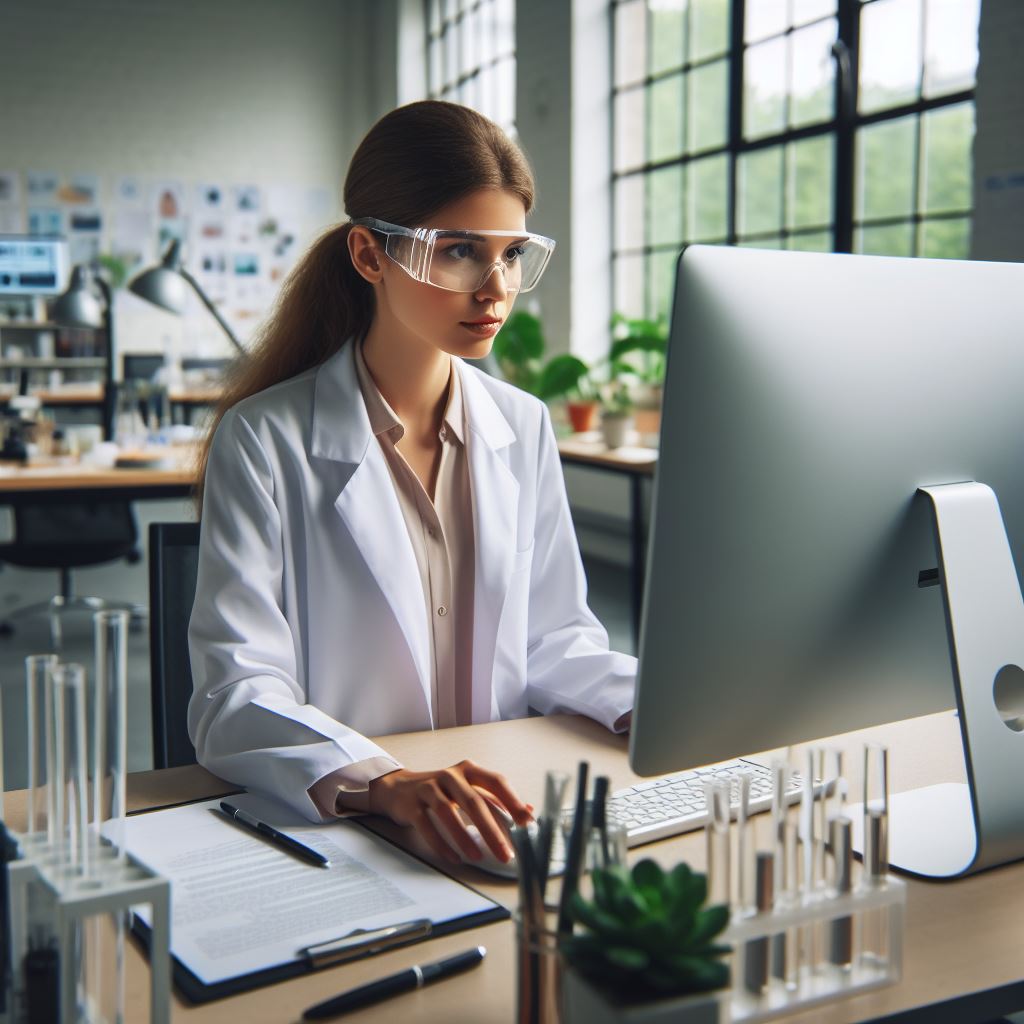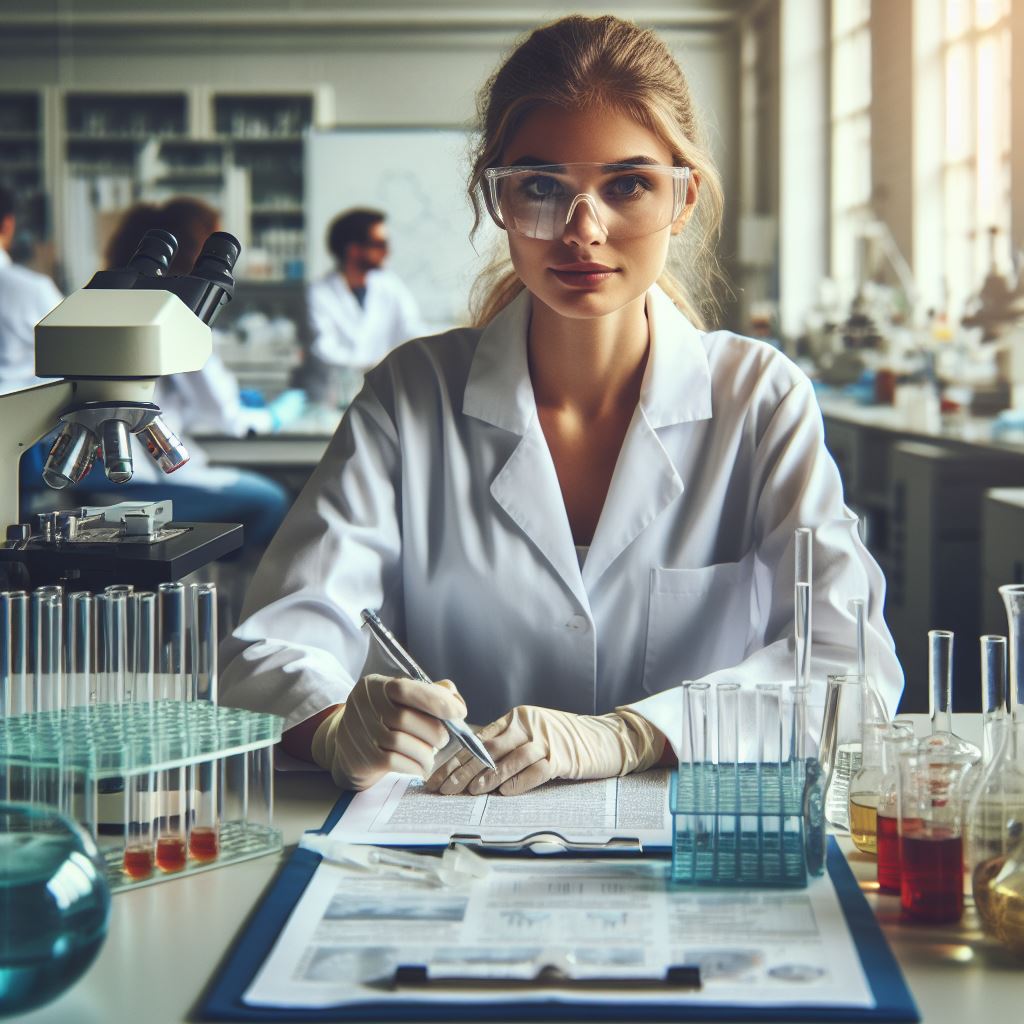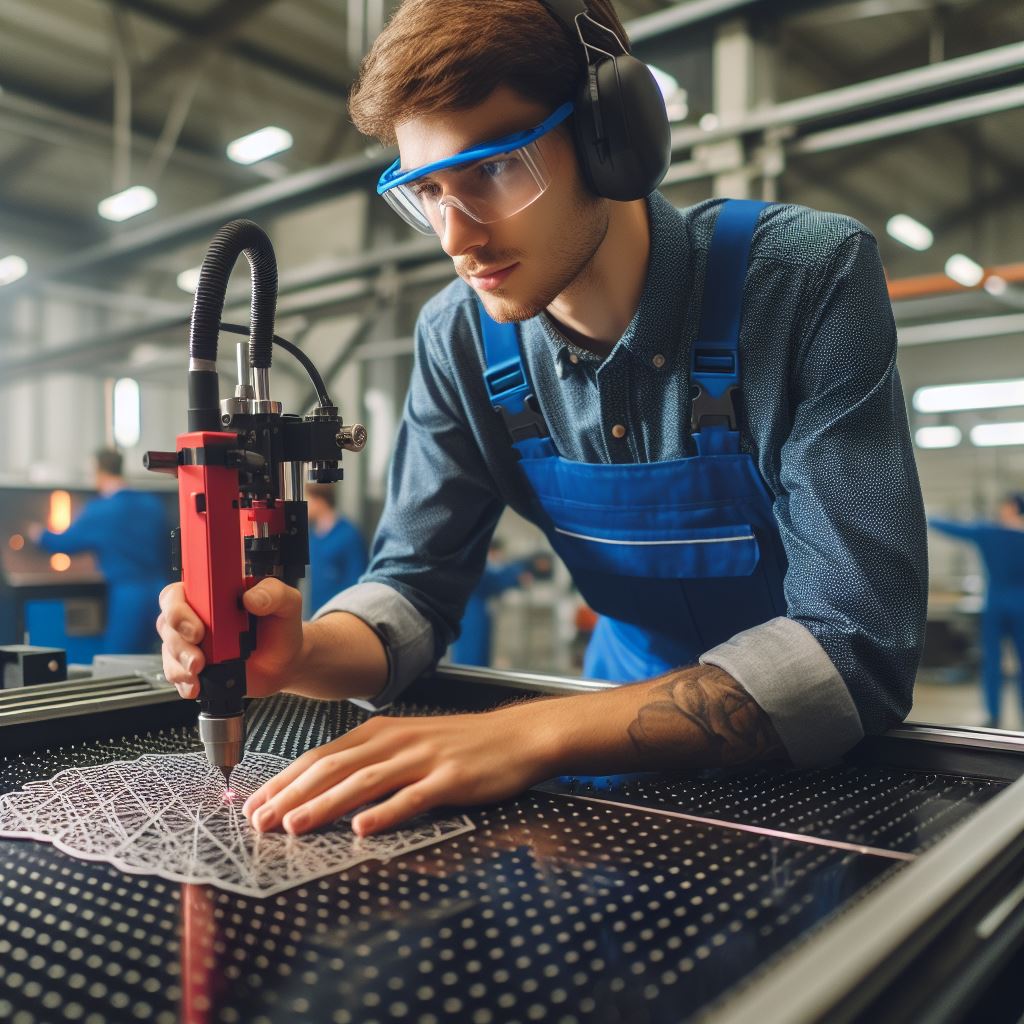Introduction
Lab technicians in the UK play a crucial role in various fields, ensuring accurate results and maintaining lab operations.
This blog post aims to provide an insight into the daily life of a UK lab technician.
Lab technicians are vital in medical, scientific, and research fields, conducting experiments, analyzing samples, and assisting in groundbreaking discoveries.
The purpose of this blog is to shed light on the responsibilities, challenges, and rewards that lab technicians face during their day-to-day work.
A Day in the Lab
Starting the day with precision, a UK lab technician dons their lab coat and reviews assigned tasks.
They calibrate and sterilize equipment, ensuring accuracy and reliability in test results.
Collecting samples from patients or various sources, lab technicians carefully label and organize them for analysis.
Using cutting-edge technology, lab technicians employ different techniques to analyze samples, such as microscopy, spectrophotometry, and chromatography.
They accurately record and interpret data, ensuring its integrity and making it available for further research or diagnosis.
Lab technicians collaborate closely with scientists, doctors, and researchers, discussing findings and suggesting improvements.
Quality control of lab procedures and ensuring adherence to safety protocols are crucial aspects of a UK lab technician’s role.
Troubleshooting equipment malfunctions and maintaining an organized workspace are essential for efficient lab operations.
Finally, a lab technician’s satisfaction lies in knowing their work impacts the lives of patients and contributes to advancements in scientific understanding.
The profession of a UK lab technician is essential in modern society, with their work spanning multiple fields.
This blog post has offered an overview of a typical day in the life of a lab technician, emphasizing their significant role in healthcare and scientific research.
Education and Training
Education and training are crucial for becoming a lab technician in the UK.
Here are the academic requirements, recommended educational path, and necessary certifications or licenses:
A. Academic Requirements
- A minimum of five GCSEs (or equivalent) are usually required, including English, maths, and science.
- Some employers may prefer candidates with A-levels or equivalent qualifications in relevant subjects like biology, chemistry, or physics.
B. Recommended Educational Path
- After completing secondary education, aspiring lab technicians can pursue a relevant diploma, foundation degree, or undergraduate degree.
- Options include courses in biomedical science, laboratory science, applied science, or a specific discipline within the field.
- Gaining practical lab experience through internships or part-time work can also be beneficial.
C. Specific Certifications or Licenses
It’s important to note that academic requirements and specific certifications may vary depending on the employer and the level of responsibility within the lab technician role.
Lab technicians play a critical role in various scientific and medical settings.
Their work involves conducting tests, experiments, and analyses that contribute to research, diagnosis, and treatment.
To ensure accuracy and reliability, it’s essential for lab technicians to have a solid educational background and ongoing training.
Personalized UK Career Consulting
Receive tailored career guidance designed just for you. Get actionable steps and expert support to boost your career in 1-3 days. Take control of your career now.
Get StartedStarting from secondary education, individuals interested in becoming lab technicians should focus on science-related subjects.
Obtaining at least five GCSEs, including English, maths, and science, is a typical requirement for entry into this field.
A-levels or equivalent qualifications in biology, chemistry, or physics are often preferred by employers as well.
After completing secondary education, aspiring lab technicians can choose from various educational paths.
They may opt for a diploma or foundation degree in subjects related to laboratory science, biomedical science, or applied science.
Alternatively, pursuing an undergraduate degree in a specific discipline within the field is another viable option.
D. Key Steps for Advancing as a Lab Technician in the UK
While theoretical knowledge is important, practical experience is equally valuable.
Aspiring lab technicians are encouraged to seek internships or part-time work in laboratory settings to gain hands-on experience.
This not only enhances their skills but also demonstrates their commitment to the field.
To stand out in the competitive job market, obtaining certifications is highly recommended.
The Institute of Biomedical Science (IBMS) offers the Certificate of Competence, which assesses the competency of lab technicians in various areas of work.
Though not mandatory, this certification demonstrates professionalism and dedication to the field.
In addition, some lab technician roles may require registration with the Health and Care Professions Council (HCPC).
This registration ensures that professionals meet specific standards of proficiency and conduct in their practice.
In fact, education and training play a vital role in the career of a lab technician in the UK.
Meeting the academic requirements, choosing the right educational path, and obtaining relevant certifications or licenses contribute to a successful and fulfilling career in this field.
Read: Surveyors and Environmental Protection in the UK
Morning Routine
Starting the day as a lab technician involves careful preparation and adherence to strict protocols.
Every morning begins with routine tasks that set the foundation for a successful day in the lab.
A. The Typical Start of a Lab Technician’s Day
Lab technicians typically arrive at work early in the morning, ready to tackle the day’s challenges.
They begin by reviewing any ongoing experiments or projects they were working on the previous day.
After settling in, lab technicians check their emails and messages to ensure they are aware of any urgent or important notifications.
This helps them plan their day efficiently and address any immediate concerns promptly.
B. Preparing for Daily Tasks
Once the initial information has been reviewed, lab technicians start preparing for their daily tasks.
This involves gathering all the necessary equipment and materials required for the experiments scheduled for the day.
Lab technicians carefully inspect their supplies to ensure they have everything they need.
They check the expiration dates on chemicals, confirm the availability of required reagents, and check that all necessary lab equipment is clean and functioning correctly.
If any item is missing or close to expiration, lab technicians take the necessary steps to order or obtain replacements, ensuring a seamless workflow throughout the day.
C. The Importance of Cleanliness and Safety Protocols in the Lab
Before diving into experiments, lab technicians prioritize cleanliness and safety in the lab environment.
They thoroughly clean and organize their workstations, ensuring that all surfaces and equipment are free from any previous experiment residue or potential contamination.
Your Dream Job Starts with a Perfect CV
Get a tailored CV and cover letter that captures your unique strengths and stands out in your industry. Let us help you make an unforgettable first impression.
Get StartedLab technicians strictly follow all safety protocols, wearing appropriate personal protective equipment (PPE) such as lab coats, gloves, and safety goggles.
These measures protect both the technicians and the integrity of the experiments being conducted.
Additionally, lab technicians regularly conduct safety inspections, checking emergency equipment such as fire extinguishers and eye wash stations to ensure their proper functioning at all times.
Lab technicians also dispose of waste materials correctly, separating hazardous waste from regular trash and following established procedures for disposal.
By maintaining a clean and safe working environment, lab technicians not only protect themselves but also ensure the accuracy and reliability of their experimental results.
The morning routine for a lab technician is essential for setting the stage for a productive and safe day in the laboratory.
Through careful preparation and emphasis on cleanliness and safety protocols, lab technicians can carry out their tasks efficiently and confidently.
Read: Historic Building Surveying in the United Kingdom
Job Responsibilities
As a lab technician, I have a range of tasks and responsibilities that keep me busy throughout the day.
Here’s a glimpse into my daily routine:
A. Main tasks and responsibilities
- Preparing samples and specimens for analysis and conducting various laboratory tests.
- Recording and analyzing data accurately, ensuring precision and attention to detail.
- Operating and maintaining laboratory equipment, ensuring proper functioning and calibration.
- Assisting in the development and improvement of laboratory procedures and protocols.
- Ensuring compliance with safety regulations and maintaining a clean and organized work environment.
B. The importance of equipment preparation and calibration
Before conducting any experiments or tests, lab technicians need to ensure that the equipment is properly prepared and calibrated.
Equipment preparation involves cleaning, sterilizing, and setting up apparatus and tools required for specific tests.
This step is crucial to maintain the accuracy and reliability of results.
Calibration, on the other hand, ensures that the equipment is accurate and provides precise measurements.
Regular calibration helps in detecting any potential errors or deviations, which can be critical for the success of experiments and analyses.
C. Lab technicians in conducting experiments, tests, and analyses
Lab technicians play a vital role in the execution of experiments, tests, and analyses.
They follow strict protocols and guidelines to ensure the validity and reproducibility of results.
Lab technicians collect samples, apply various techniques to analyze them, and interpret the obtained data.
They may work with a wide range of samples, from medical specimens to environmental samples, depending on the nature of their work.
They use different instruments and equipment to carry out tests and experiments accurately.
During experiments, lab technicians closely monitor variables and make necessary adjustments to ensure the best possible outcomes.
They document their actions, findings, and observations meticulously to create a detailed record of the process.
Once the experiments, tests, or analyses are completed, lab technicians are responsible for analyzing the collected data.
They use statistical tools, software, and other resources to interpret the data and draw meaningful conclusions.
Optimize Your LinkedIn for Success
Boost your LinkedIn profile with a professional bio, keyword-rich headline, and strategic recommendations that attract recruiters. Stand out from the crowd and get noticed.
Optimize NowLab technicians often collaborate with other professionals, such as scientists or researchers, sharing their findings and contributing to the overall progress of scientific investigations.
They may also assist in writing reports or papers summarizing their work and presenting the results.
In short, lab technicians play a crucial role in conducting accurate and reliable experiments, tests, and analyses.
Their attention to detail, proper equipment preparation, and adherence to protocols contribute significantly to the quality of scientific research and advancements.
Read: Essential Tools for Every UK Surveyor

Collaboration and Communication
In the dynamic world of a UK lab technician, collaboration is the heartbeat of daily operations.
A. Collaborative Nature
- Lab technicians thrive in teamwork, fostering an environment of shared goals and collective success.
- Their day involves constant interaction with diverse professionals, creating a vibrant and interconnected work ecosystem.
B. Interacting with Professionals
- Engaging with scientists, lab technicians contribute to experimental planning and execution, ensuring precision and accuracy.
- Collaboration extends to researchers, as lab technicians play a pivotal role in data collection and analysis.
C. Importance of Communication and Teamwork
- Effective communication is the cornerstone; technicians articulate findings, ensuring seamless understanding among team members.
- Teamwork skills shine as lab technicians navigate intricate experiments, relying on each other’s strengths for optimal outcomes.
In the bustling realm of a UK laboratory, a day in the life of a lab technician is a symphony of collaboration and communication.
Read: Key Differences: Quantity vs. Land Surveyors
Explore Further: Electrical Engineering Salaries in the UK 2024
Discover More: UK Mechanical Engineering: A Career Overview
Problem-Solving and Troubleshooting
Lab technicians play a crucial role in identifying and resolving issues that arise during experiments or with equipment.
They are the problem-solvers in the laboratory, ensuring the smooth execution of scientific procedures.
Here are some insights into their role in troubleshooting and finding solutions to technical problems:
A. Identifying and Resolving Issues in Experiments or Equipment
- Lab technicians are responsible for closely monitoring experiments to detect any unexpected deviations.
- They meticulously review data and results to identify any discrepancies or anomalies.
- Lab technicians use their expertise to identify the root cause of issues in experiments or equipment.
- Once the problem is identified, they take necessary steps to resolve it and ensure accurate results.
- They collaborate with scientists and researchers to analyze the impact of issues and devise solutions.
B. Role in Troubleshooting
- Lab technicians excel in troubleshooting technical problems, such as malfunctioning equipment or faulty reagents.
- They possess a deep understanding of laboratory instruments and methodologies to identify potential issues.
- Lab technicians utilize their knowledge of scientific principles and protocols to troubleshoot experiments effectively.
- They carefully assess all variables involved in the experiment to pinpoint the source of the problem.
- Troubleshooting also involves consulting manuals, conducting research, and seeking guidance from colleagues.
C. Finding Solutions to Technical Problems
- Lab technicians rely on their critical thinking skills to devise solutions for technical problems.
- They explore alternative methods and techniques to overcome challenges encountered during experiments.
- Lab technicians collaborate with colleagues to brainstorm innovative solutions.
- They engage in continuous learning to stay updated with the latest advancements in their field.
- Lab technicians document their troubleshooting processes and share their findings with the scientific community.
D. Examples of Common Challenges Lab Technicians Face
- Calibration issues with laboratory instruments, leading to inaccurate measurements.
- Equipment breakdowns during critical experiments, requiring immediate troubleshooting.
- Contamination of samples or reagents, affecting the reliability and validity of results.
- Interference from external factors, such as environmental conditions or electrical disturbances.
- Problems with data analysis and interpretation, necessitating a thorough review and reevaluation.
In essence, lab technicians are vital in problem-solving and troubleshooting within the laboratory.
Their ability to identify and resolve issues, along with their role in finding solutions, ensures the creation of reliable and accurate scientific data.
Despite the challenges they face, lab technicians remain dedicated to their work, continually improving their problem-solving skills to contribute to the advancement of scientific knowledge.
Discover More: Emerging Technician Specialties in the UK
Professional Development
A. The opportunities for professional growth and advancement in the field
In the field of lab technology, there are several opportunities for professional growth and advancement:
- Continuing education options allow lab technicians to stay updated on the latest advancements and techniques.
- Specialized training programs provide in-depth knowledge in specific areas of lab technology.
- Professional organizations, such as the British Society for Clinical Laboratory Sciences (BSCLS), offer support and resources to lab technicians.
- Membership in these organizations provides access to networking events, conferences, and workshops.
- Lab technicians can also take advantage of mentorship programs to enhance their skills and knowledge.
- Participating in these programs allows technicians to learn from experienced professionals in the field.
- Lab technicians can pursue various certifications to demonstrate their expertise and enhance their career prospects.
- Some certifications include the Medical Laboratory Technician (MLT) Certification and the Clinical Laboratory Scientist (CLS) Certification.
Continued professional development is essential for lab technicians to stay competitive and provide the best possible care to patients.
B. Continuing education options for lab technicians
In addition to professional growth opportunities, lab technicians also have access to various continuing education options:
- Online courses are a convenient and flexible way for lab technicians to expand their knowledge.
- These courses cover a wide range of topics, including advanced laboratory techniques and instrumentation.
- Lab technicians can also attend workshops and seminars to learn about new research findings and emerging technologies.
- Some employers offer tuition reimbursement programs, allowing lab technicians to pursue higher education degrees.
- Lab technicians can choose to specialize in a particular area, such as molecular biology or microbiology.
- Specializing can open up new career opportunities and lead to higher salaries.
C. Professional organizations or societies that support lab technicians’ development
To support the development of lab technicians, various professional organizations and societies exist:
- The British Society for Clinical Laboratory Sciences (BSCLS) is a leading professional organization for lab technicians in the UK.
- BSCLS provides access to resources, publications, and online forums for knowledge sharing and collaboration.
- Another organization that supports lab technicians is the Institute of Biomedical Science (IBMS).
- The IBMS offers professional development opportunities, including workshops, conferences, and webinars.
- Lab technicians can also join online communities and forums to connect with peers and share experiences.
- These platforms allow technicians to stay updated on industry trends and seek advice from experts.
In general, as a lab technician in the UK, there are numerous opportunities for professional development and growth.
Continuing education options, specialized training programs, and professional organizations all contribute to the advancement of lab technicians.
By staying updated on the latest advancements and seeking additional certifications, lab technicians can enhance their skills and career prospects.
Delve into the Subject: Navigating a Career in UK Property Surveying
Conclusion
A typical day in the life of a UK lab technician involves a range of tasks and responsibilities.
They play a crucial role in various fields such as healthcare, research, and forensics.
Lab technicians are responsible for conducting experiments, analyzing samples, and ensuring accurate results.
Their work directly impacts scientific advancements, patient diagnoses, and treatment plans.
Given the importance of their role, considering a career as a lab technician in the UK can be highly rewarding and fulfilling.
It provides opportunities to contribute to scientific discoveries and make a significant difference in people’s lives.
So, if you have a passion for science and a keen eye for detail, becoming a lab technician could be a great career choice for you.
Start exploring the exciting world of laboratories and unlock your potential in the UK.
[E-Book for Sale]
500 Cutting-Edge Tech Startup Ideas for 2024 & 2025: Innovate, Create, Dominate
$19.99 • 500 Tech Startup Ideas • 62 pages
You will get inspired with 500 innovative tech startup ideas for 2024 and 2025, complete with concise descriptions to help you kickstart your entrepreneurial journey in AI, Blockchain, IoT, Fintech, and AR/VR.




